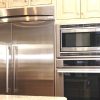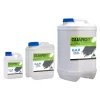
The Environmental Protection Agency of the United States classifies some common household products as hazardous materials and proposes specialized waste disposal protocols to be followed. Leftovers of these materials that are at a high risk of catching fire, reacting, or exploding under certain circumstances are deemed unsafe.
There are also products that are corrosive or toxic, which are also classified as household hazardous waste. Products that include chemical cleaners, paints, oils, acid, batteries, electronic waste, pesticides, and more can be flagged as dangerous.
These items have potentially hazardous ingredients that also make them a hazard when they are left lying around or if they are not disposed of properly. Collectively, these sorts of products are known as Hazardous Household Waste (HHW).
Proper Education on HHW
Many communities offer specialized disposal or collection programs that target HHW. These are done in an effort to educate the general public and to keep accidental injuries to a minimum. Using the Earth 911 database and entertaining your zip code will provide you with information about your closest collection and disposal facilities. A call to your local environmental department or waste disposal agency will also give you options for safe and approved HHW collection and disposal.
To avoid risks related to common products, homeowners and community members need to know what products are classified as HHW and how they should handle and dispose of them. Incorrect disposal of HHW is dangerous. This is why you should not dispose of them by dumping them into waterways, flushing them down drains, burning them, throwing them in the trash, tossing them on the ground, or doing anything other than letting skilled and professional waste disposal professionals handle them.
The dangers of unsafe methods of disposal might not be clear right away. However, improper disposal can contaminate the soil, pollute the water supply, and pose a serious poisoning hazard for pets and children! At HCI Environmental, we pride ourselves in being committed to keeping you and your family safe by offering the best in customized hazardous waste disposal services.
Proper Disposal of HHW
Some tips from safety experts on how to properly handle and dispose of household hazardous wastes include the following:
- Follow provided warnings and instructions about storage and disposal that are provided on the containers and labels for HHW products.
- Always take the time to read product labels to make sure there is no chance of accidentally igniting, mixing or creating hazardous conditions.
- Never keep hazardous products in other containers used for food or other products, and ensure they are labeled clearly with what is inside the container.
- Do not combine different HHW products together, even just small amounts left after use, as they can create fumes, explode, or even catch fire.
If your community doesn’t offer regular collection and disposal events, call your officials to see when the next collection event will be held.
Call a local HHW disposal company if needed and schedule a pickup or drop-off time to ensure your HHW is disposed of correctly.
- Remember, empty containers can still be a threat as there is often a residual product that can cause problems in the landfill.
- Check your home often for forgotten products that can not be used and should be properly disposed of before they become a risk.
- Follow listed instructions for clean up and use all recommended Personal Protection Equipment when handling and disposing of HHW.
- Use common sense, don’t pour liquids down the drain, don’t try and burn old containers, and call the pros for proper container disposal.
Examples of Common HHW
Okay, so what type of Hazardous Household Waste can be found in the average home? The answers might well surprise you! How many of these are in your home right now?
Flammable Liquids & Gasoline
This classification of HHW includes chemical solvents, BBQ lighter fluid, gas or propane fuel, kerosene, and gasoline. They are blended and burned as fuel and pose a significant fire hazard.
Toxics
These HHW include things like furniture strippers, sprays, aerosols, solvents, bleach, cleaners, and similar products. They can be very flammable and also produce poisonous fumes.
Pesticides/Fertilizers
These are products used to kill pests in the garden and to feed plants in the landscape. They are flammable, poisonous, and can cause injury to eyes and skin, and can be deadly if ingested.
Corrosives
HHWs of this classification include rust remover, acids, cleaners, alcohol, and other products that can irritate the skin, eyes, and lungs. They need special handling to be safely disposed of.
Benefits of Recycling
Aside from specialized collection and disposal procedures, the best way to reduce the amount of HHW ending up in landfills is to recycle as much as possible and cut down on waste. Recycling has many benefits, which include:
Environment
Recycling provides many benefits to our environment:
- Conserve resources: Recycling reduces the need to harvest more natural resources for production.
- Climate change: Recycling and composting solid waste reduces carbon monoxide pollution
- Energy savings: Recycling conserves energy by reducing how much new product must be made
- Waste reduction: Recycling lowers landfill volumes and keeps air and water pollution lower
Economy
EPA research has found that in a single year, recycling and reuse activities in the United States accounted for hundreds of thousands of jobs and billions in revenue and paid wages. For more information, check out the full report. No matter how small a step it might seem, recycling a little more, keeping a few more packages and bottles out of the landfill, and being more mindful of HHW in the home can help reduce pollution and environmental impacts.
Conclusion
If you are looking for the one thing you can do to make a positive impact on the environment while also keeping your family safe, look no further. Smart hazardous household waste disposal is key! Looking out for hazardous materials like paints, cleaners, chemicals, oils, and other common products ensures they do sit and accumulate in your home.
When you need to dispose of leftover HHW materials, it is important to do so safely and correctly. Local officials can offer assistance, or you can call a local waste disposal company to take care of the dirty work for you! Click here to see why HCI Environmental is the name more people in the area trust for all their hazardous household waste collection and disposal needs!







